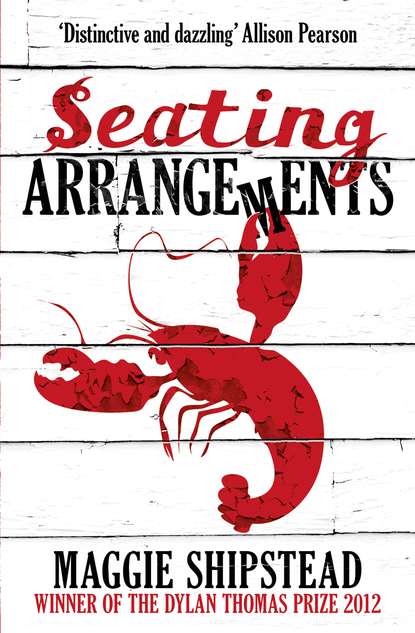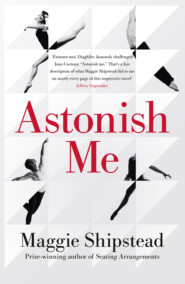По всем вопросам обращайтесь на: info@litportal.ru
(©) 2003-2025.
✖
Seating Arrangements
Автор
Год написания книги
2018
Настройки чтения
Размер шрифта
Высота строк
Поля
Before he became a father, Winn had assumed he would have sons. He had expected Daphne to be a boy, had lain with his ear against Biddy’s pregnant belly and heard male voices echoing down from future lacrosse games and ski trips. He saw a small blue blazer with brass buttons, short hair combed away from a straight part, himself teaching a boy to tie a necktie. He would drive his son to Harvard when the time came and help him carry his bags through the Yard, would greet his son’s roommates and their fathers with hearty handshakes. His son would join the Ophidian Club, and Winn would attend the initiation dinner and drink with the boy who would live his life over again, affirming its correctness at every juncture.
When the screaming ham hock the doctor pulled from between Biddy’s legs turned out to be unmistakably female, all crevices and puffiness, he felt a deep and essential surprise, not only that the child brewing in his wife those nine months was a girl but that he, Winn, possessed the seeds of a feminine anything. Inside the tangled pipes of his testicular factory there existed, beyond all reason, women. Watching Biddy and Daphne nestle together in the hospital bed, he realized he had been mistaken to think that pregnancy and birth had something to do with him. He had imagined that by impregnating this woman he had ensured she would deliver a son who would go forth and someday impregnate another woman who would, in turn, have a son, and so on and so forth down the Van Meter line into the misty future. But now, instead, there was this girl-child who would grow breasts and take another man’s name and sprout new branches on an unknown family tree and do all sorts of traitorous things a son would not do. The shifting and swelling of Biddy’s boyish body into a collection of spheroids, the quiet communion she lavished on her belly, her new status with her sisters and her covey of friends—all this should have told him he was standing at the threshold of a club that would not have him. Even though women held out their arms and exclaimed, “You’re going to be a faaa-ther!” he suspected they had seen him all along for what he was: the adjunct, the contributor of additional reporting, the lame duck about to be displaced from the center of his wife’s affections. The surprise should not have been that he had a daughter but that any boys were ever born at all.
When, five years later, Biddy announced she was pregnant for the second time, Winn assumed from the first that the baby would be a girl. The deck was stacked; the game was rigged. Daphne was so staunchly female that the possibility of his and Biddy’s genes being put back in the tumbler and coming out a boy seemed too small to bother with. Biddy gave him the news in bed in the morning, and he kissed her once, hard, and said, “Well!” before going downstairs to sit behind the Journal and think about a vasectomy. He was at the kitchen table, staring sightlessly at the pages when he heard the rustling, tinkling sound that announced Daphne. She slid into a chair and sat eating red grapes out of a plastic bag. She wore a piece of crenellated, bejeweled plastic in her hair, and a cloud of pink gauze stood up where her skirt bent against the back of the chair.
“Good morning, Daphne. Going to dance class today?”
“No. That’s on Wednesday.”
“Isn’t that a dance skirt you’re wearing?”
“My tutu? I just threw this on.”
Winn stared at her. She looked back at him and fingered one of the strands of plastic beads that garlanded her neck. Somehow in her infancy she had absorbed a set of phrases and mannerisms that Biddy called breezy and Winn called absurd but that, in any event, had her swanning through preschool like an aging socialite. They left her once with Biddy’s eldest sister, Tabitha, and went to Turks and Caicos for a week, hoping Tabitha’s son Dryden would get her to dirty her knees a little. Instead, they returned to find Dryden draped in baubles and Daphne arranging clips in his hair.
“Dryden,” Biddy said, “you look awfully dressed up for this time of day.”
The boy released a sigh of weary sophistication. He fluttered his blue-dusted eyelids and spread his fingers against his chest. “Oh, this? This is nothing. The good stuff’s in the safe.”
To Winn, Daphne was a foreign being, a sort of mystic, a snake charmer or a charismatic preacher, an ambassador from a distant frontier of experience. The academic knowledge that she was the product of his body was not enough to forge a true belief; he felt no instantaneous, involuntary recognition of her as flesh and blood. Not for lack of trying, either. He had changed her diapers and held her while she cried in the night and spooned gloopy food into her mouth, and certainly he loved her, but she only became more and more strange to him as she got older, and his love for her gave him no comfort but instead made him alarmingly porous, full of hidden passageways that let in feelings of yearning and exclusion. Sitting behind the paper, he imagined with trepidation a house populated by two Daphnes, a Biddy, and only one Winn.
“Daddy,” came the piping voice from across the table, “am I a princess?”
“No,” Winn said. “You’re a very nice little girl.”
“Will I be a princess someday?”
Winn bent the top of the newspaper down and looked over it. “It depends on whom you marry.”
“What does that mean?”
“Well, there are two ways for a woman to become a princess. Either she’s born one, or she marries a prince or, I think, a grand duke—although I’m not sure those exist anymore. You see, Daphne, many countries that used to have princesses don’t anymore because they’ve abolished their monarchies, and an aristocracy doesn’t make sense without a monarchy. Austria, for example, got rid of all that business after the First World War. Hereditary systems like that aren’t fair, you see, and they breed resentment among the lower classes. Anyway, the long and short of it is, since you weren’t born a princess, you would need to marry a prince, and there aren’t very many of those around.”
Reproachfully, she ate a grape and then wiped her fingers one at a time on a napkin. He returned to reading.
“Daddy.”
“What?”
“Am I your princess?”
“Christ, Daphne.”
“What?”
“You sound like a kid on TV.”
“Why?”
“Because you’re full of treacle.”
“What’s treacle?”
“Something that’s too sweet. It gives you a stomachache.”
She nodded, accepting this. “But,” she pressed on, “am I your princess?”
“To the best of my knowledge, I don’t have any princesses. What I do have is a little girl without any dignity.”
“What’s dignity?”
“Dignity is behaving the way you’re supposed to so people respect you.”
“Do princesses have dignity?”
“Some do.”
“Which ones?”
“I don’t know. Maybe Grace Kelly.”
“Who is she?”
“She was a princess. First she was an actress. Then she married a prince and became a princess. In Monaco. She was killed in a car accident.”
“What’s Monaco?”
“A place in Europe.”
Daphne took a moment to absorb and then asked, “Am I your princess?”
“We’ve just been through this,” Winn said, exasperated.
She looked like she was trying to decide whether her interests would be better served by smiling or crying. “I want to be your princess,” she said, teetering toward tears. Daphne was an accomplished crier, plaintive and capable of great stamina. For a girl so physically delicate and soft in voice, she was unexpectedly stalwart in her emotions. Her tears were purposeful, as were her smiles and pouts. Biddy called her Lady Macbeth.
Ducking back behind his paper, Winn did what was necessary. “All right,” he said. “Daphne, you are my princess.”
“Really?”
“Absolutely.”
Daphne nodded and ate a grape. Then she cocked her head to one side. “Am I your fairy princess?”
Biddy, when Winn went looking for her, was getting out of the shower. Through the closed door he heard the water shut off and the rattle of the shower curtain. She was humming something to herself. He thought it might be “Amazing Grace.” Knocking once, he pushed open the door, releasing a cloud of steam. Her bare body, flushed from the shower, was so close he could feel the heat coming off her back and small, neat buttocks. A foggy oval wiped on the mirror framed her breasts and belly button, the dark badge of hair below, his tight face hovering over her shoulder. After fall stripped away her summer tan, her skin tended toward a certain sallowness, but the hot water had turned her chest and legs a rosy pink. Already, her breasts looked swollen. A white towel was wrapped around her head. Her reflection smiled at him. Biddy, he had planned to say, maybe one is enough. He would suggest they sit down and make a pros and cons list. He was holding a yellow legal pad and a blue pen and had already thought of cons to counter all possible pros.
“What is it?” she asked, her smile draining away. He wondered if she had already guessed that he had trailed her to this warm, foggy room to argue her baby away from her. She had some lotion in her hand, and he watched her rub it on her sides and stomach, across stretch marks from Daphne that were only visible in the pale months. “Winn?” she asked. “What?”
“What was that you were just humming?” he asked.







